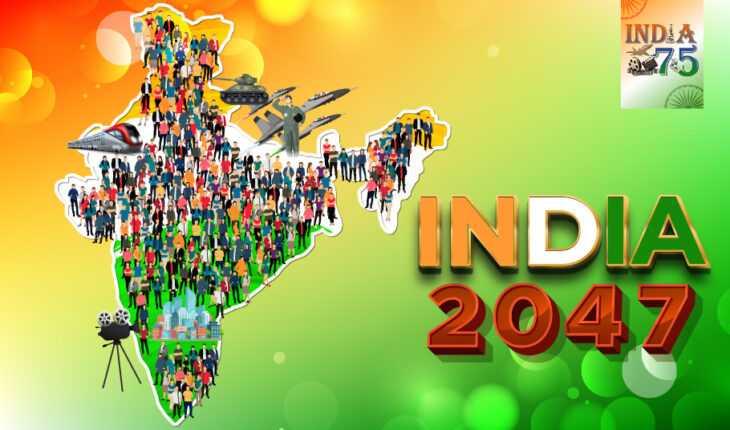
India can become a developed country in the year 2047, which will be the hundredth year of India’s independence. This fact come out from the analysis of income tax returns filed by the citizen of India, according to the World Bank, the population of India is 140 crores now, which will increase to 161 crores in the year 2047.
At present the number of workers in India is 53.0 crores, which may increase to 72.5 crores in the year 2047. In percentage term it is 37.9 today, which will increase to 45 in the year 2047. At the same time, the number of workers/professionals/businessmen, who are eligible to pay income tax is 31.3 crore at present, which may increase to 56.5 crore in the year 2047. In percentage term it is 59.1, which may increase to 78 in the year 2047. According to the United Nations, the number of workers aged 15 to 64 will remain at a high level until the year 2040, but after that it will decrease. This shows that there will be a boom in economic activities till 2040, which will help India to become a powerful country in the world.
In 2047, 22 percent of the workers will be associated with agriculture. Since, farmers working in agriculture sector are exempted from income tax. Therefore, due to the decrease in the number of workers in agriculture and increase in their number in other sectors, there will be a significant increase in income tax collection. In the assessment year 2023, the weighted average income of Indians has become Rs.13 lakh, which can increase to Rs.49.7 lakh in the year 2047. It may be noted that the weighted average income of Indians in the assessment year 2013-14 was just Rs.4.4 lakh.
The number of income tax return filers in assessment year 2023 has increased from 7.3 crore to 7.8 crore in comparison to assessment year 2022. Of these, 5.8 crore or 75 per cent income tax returns were filed before the due date. There has been a huge reduction in the number of people filing income tax returns with penalty charges after the due date. In the assessment year 2020, the number of such people was 60 percent, which decreased to 25 percent in the assessment year 2023. In the assessment year 2024, 6.8 crore people filed income tax returns by the due date, while by March 2024, 1.8 to 2.0 crore people can file income tax returns. There has been a significant reduction in the percentage of people filing NIL income tax returns in assessment year 2023. The number of such people was 84.1 per cent in assessment year 2012, which reduced to 64 per cent in assessment year 2023.
The top 5 states with the highest number of income tax return filings in AY 2023 are Maharashtra, Uttar Pradesh, Gujarat, Rajasthan, and West Bengal. Compared to the assessment year 2022, 64 lakhs more income tax returns were filed in the assessment year 2023. Maharashtra topped the list of states that filed income tax returns. Thereafter, Uttar Pradesh, Punjab, Gujarat, and Rajasthan ranked second, third, fourth and fifth respectively. Among the smaller states, Manipur, Mizoram, and Nagaland saw a 20 per cent increase in the number of income tax return filers in the last nine years. Overall, 4.81 crore more income tax returns were filed in AY 2023 as compared to AY 2015 and 1.00 crore more income tax returns were filed in AY 2023 as compared to AY 2020. Among the states filing income tax returns, the maximum increase was in Maharashtra, followed by Uttar Pradesh.
There is a difference in the place of work of income tax return filers and their permanent residence, its reason may be migration of workers to other states for employment. Linking of PAN card with Aadhaar can reveal the real picture of permanent residence of income tax return filers and state-wise percentage of income tax return filers can also change. This may also change the ranking of states filing income tax returns.
To provide better facilities to the entrepreneurs, the Udyam Portal was launched by the Modi Government on 1 July 2020, in which so far 2.2 crore Micro, Small and Medium Enterprises (MSMEs) have registered themselves. A tally of MSME registration data on the Udyam portal with state-wise income tax return filing data reveals that 2.18 crore entrepreneurs have contributed significantly to the increase in the number of income tax return filers.
In assessment year 2011, the number of income tax return filers was 1.6 crore or 84 per cent in the income tax slab of Rs.5 lakh, whose number increased to 6.85 crore in assessment year 2023. This confirms that both the number of people filing income tax returns and their income have increased in the past years.
In AY 2023 as compared to AY 2012, 13.6 per cent of those filing income tax returns have shifted to the slab above Rs 5 lakh, out of which 8.1 per cent have shifted to the slab of Rs 5 lakh to Rs 10 lakh, 3.8 Percent people have shifted from Rs 10 lakh to Rs 20 lakh slab, while 1.5 percent people have shifted from Rs 20 lakh to Rs 50 lakh slab. Whereas 0.2 percent people have shifted from Rs 50 lakh to Rs 1 crore slab and 0.02 percent people have shifted to above Rs 1 crore slab.
Not only this, but it is also estimated that in the year 2047, about 27 percent of the people filing income tax returns will shift from the bottom to the top slab. 17.5 per cent of those filing income tax returns will shift from Rs 5 lakh to Rs 10 lakh slab, while 5 per cent will shift from Rs 10 lakh to Rs 20 lakh slab. Whereas 3 percent people will shift from Rs 20 lakh to Rs 50 lakh slab, 0.5 percent people will shift from Rs 50 lakh to Rs 1 crore slab and 0.075 percent people will shift to above Rs 1 crore slab.
The increase in the number of income tax return filers and income tax collection can be attributed to various reasons such as increase in income of low-income group people, increase in the number of people who were not filing income tax returns earlier, showing low income or zero income. There is a decrease in the number of such people who are avoiding to paying tax.
It can be said that due to the appropriate policies of the government, the Indian economy is continuously getting stronger and for this reason, the per capita income is expected to increase from Rs.2 lakhs in the year 2023 to Rs.14.9 lakhs in the year 2047.
Satish Singh, Ahmedabad based Senior Columnist, Views are personal.





